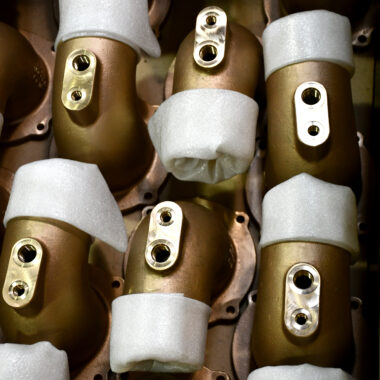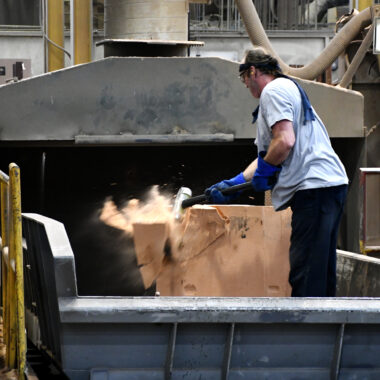Accomplish Excellence: Navigating in Casting Aluminum Illinois
Accomplish Excellence: Navigating in Casting Aluminum Illinois
Blog Article
The Art of Aluminum Spreading: Enhancing Your Skills for Superior Outcomes
Aluminum spreading is a craft that requires precision, patience, and a deep understanding of the techniques involved. As creators and craftsmens, our quest of excellence in light weight aluminum casting is a trip that calls for devotion and a continual pursuit for proficiency.
Background of Light Weight Aluminum Spreading
Light weight aluminum spreading, a process with origins tracing back centuries, has played a considerable function in the advancement of different industries. The background of light weight aluminum casting days back to the 19th century when it arised as a crucial manufacturing method. The usage of aluminum in casting procedures revolutionized sectors such as auto, aerospace, and building and construction because of its lightweight residential or commercial properties and rust resistance.
One of the earliest usages of aluminum casting can be mapped to the production of pots and pans and decorative things. As improvements in technology took place, light weight aluminum casting increased its reach to consist of engine parts, architectural components for aircraft, and intricate layouts in architectural structures. The flexibility and convenience of aluminum spreading enabled for the production of detailed shapes and layouts that were previously unattainable via other making approaches.
Today, light weight aluminum spreading continues to be a keystone of contemporary commercial procedures, enabling the manufacturing of facility components with high accuracy and efficiency (casting aluminum illinois). Comprehending the historical development of light weight aluminum casting supplies beneficial insights right into its enduring significance and continuous advancement in the commercial landscape
Vital Devices and Equipment
Using specialized devices and equipment is necessary in attaining optimum cause the light weight aluminum casting process. The essential devices needed for light weight aluminum spreading consist of a crucible for thawing the aluminum, a furnace to get to the necessary temperatures, and molds to shape the molten metal. Crucibles, usually made from graphite or ceramic materials, need to hold up against heats to avoid contamination of the aluminum. Furnaces are crucial for heating the light weight aluminum to its melting point, typically around 660 degrees Celsius, ensuring it remains in a fluid state for spreading. Mold and mildews can be found in numerous types, such as sand molds or die-casting molds, to offer the aluminum its desired form.
Protective equipment is essential to protect against injuries from the high temperature levels included in the spreading process. Generally, having the right tools and devices is critical for achieving top notch and precise aluminum castings.
Understanding the Casting Process
Having gotten the essential tools and equipment for light weight aluminum spreading, the next step towards quality hinges on understanding the intricate casting process. casting aluminum illinois. The spreading procedure includes a collection of steps that require skill, precision, and interest to detail to make certain superior results

Moreover, putting the liquified aluminum right into the mold ought to be done steadily and without disruption to avoid air entrapment or incomplete fills up. When the light weight aluminum has actually solidified, thoroughly getting rid of the spreading from the mold and mildew without causing any type of damage is important. Post-casting processes such as trimming, sanding, and completing must be lugged out diligently to accomplish the wanted last item. Understanding each action of the spreading process is crucial to creating high-grade light weight aluminum spreadings.

Advanced Techniques and Tips
Mastering complex information and executing innovative techniques can raise the quality and precision of light weight aluminum spreading processes. One sophisticated strategy is using ceramic molds, which supply a smoother surface area finish and higher dimensional precision compared to traditional sand molds. In addition, using vacuum casting techniques see here now can help in reducing porosity in the final casting, leading to more powerful and extra durable light weight aluminum parts.
One more suggestion is to pre-heat the molds prior to putting the liquified aluminum to improve the flowability of the steel and lower the likelihood of problems such as chilly shuts or misruns. Using chill obstructs purposefully can aid i loved this regulate the solidification price of the light weight aluminum, lessening interior anxieties and boosting the general mechanical properties of the cast component.
Last but not least, understanding the art of gating and risering is crucial for achieving audio spreadings. Appropriately made gating risers and systems can aid stop shrinking problems and ensure an attire flow of steel throughout the mold tooth cavity, causing remarkable casting top quality. By incorporating these innovative methods and suggestions into your light weight aluminum casting process, you can improve the uniformity and accuracy of your end products.
Troubleshooting Common Spreading Issues
Attending to typical casting concerns needs a systematic approach to determine and correct elements influencing the high quality of aluminum spreadings. One prevalent trouble is porosity, which leads to tiny openings or voids in the spreading due to gas entrapment. This concern can be reduced by properly degassing the liquified aluminum prior to casting and ensuring appropriate venting in the mold and mildew. An additional common difficulty is shrinkage flaws, where the spreading contracts erratically helpful resources during air conditioning, resulting in splits or distortion. To address shrinking, readjusting the gating system layout and enhancing the riser positioning can help promote consistent solidification. Furthermore, incorrect mold filling can trigger concerns like misruns or cold shuts, leading to insufficient castings. Enhancing the gating system, enhancing putting techniques, and making sure appropriate metal temperature level are essential in avoiding such flaws. By recognizing these common spreading troubles and implementing effective options, light weight aluminum wheels can improve the general quality and integrity of their castings.
Final Thought
Finally, understanding the art of aluminum spreading needs a deep understanding of the history, vital tools, and advanced techniques included in the process. By honing your abilities and repairing typical spreading issues, you can attain premium outcomes in your casting tasks. Continual technique and dedication are vital to improving your abilities and producing high-quality light weight aluminum castings.
Grasping each step of the spreading procedure is essential to generating high-quality light weight aluminum castings.
Additionally, employing vacuum casting approaches can assist reduce porosity in the last casting, resulting in more powerful and extra long lasting aluminum components.
Attending to typical spreading problems calls for a methodical approach to identify and fix aspects impacting the high quality of aluminum castings. By recognizing these typical casting troubles and implementing reliable solutions, light weight aluminum wheels can improve the total quality and integrity of their spreadings.
By honing your skills and repairing usual spreading issues, you can achieve superior outcomes in your spreading tasks.
Report this page